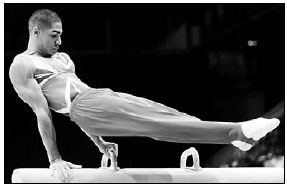Top News
Smith ready to turn heads at London Olympics
(China Daily)
Updated: 2011-05-01 07:24
 |
Large Medium Small |
|
Britain's Louis Smith performs his routine on the pommel horse in the men's Individual aparatus final at the 42nd Artistic Gymnnastics World Championships last year in Rotterdam. Pierre-Philippe Marcou / AFP |
LONDON - Olympic bronze medallist Louis Smith displays his boyish nature as he sits with a pom-pom on his head but beneath the playful facade is a character mature beyond his young age.
The third-placed pommel horse gymnast in Beijing in 2008 feels he performs the most difficult routine in the world and, if things go to plan, wants to lead the British team to a memorable medal haul at the 2012 London Games.
"Gymnastics is such a hit-and miss-sport, it's important to have an anchor," the 22-year-old said at a Kinect Sports Superstars event in London earlier this month.
"Someone who's been through it all before and can keep the team together and who you can rely on to put in a solid performance. We haven't got many of those and I feel like I can be that anchor."
In Beijing, Smith became the first Briton in 80 years to win an Olympic gymnastics medal but it has not made him over-confident.
"I can't just sit here and rest on my laurels and say 'I got a bronze in Beijing so you should pick me'. That's arrogant and selfish. I believe in working hard," he said.
Moments later Smith reached for a nearby pom-pom and put it on his head before dramatically flicking it aside like hair.
"I sing in the shower," he said, jokingly contemplating a stage career when his gymnastics days are done.
The career span of a gymnast is often a short one but Smith is not worried about that at all.
"When the day comes to leave gymnastics it will be a sad day ... but there's no reason why I should be finishing anytime soon," he said.
He is one of the fortunate few British gymnasts who have succeeded on the big stage even though his sport traditionally did not attract the kind of financial backing or television coverage enjoyed by his compatriots in athletics or even track cycling.
Breakthrough
But once Smith finished third behind home favorite Xiao Qin and Croatian Filip Ude at the Beijing Olympics, the entire British team started to see the money rolling in.
"All it took was for one person to break through on a major scale for gymnastics and then all of a sudden you've got lots of money. That was my medal in Beijing," said Smith, who has since won silver at the 2010 world championships.
"Now look what's happened. Daniel Keatings, Daniel Purvis and Kristian Thomas are all making world finals and all getting medals because of the increase in funding."
Britain's gymnasts failed to qualify a single man for the Athens Olympics in 2004, resulting in the immediate loss of funding for the men's program.
Then Smith's pommel horse bronze at the 2007 World Championships followed by the Beijing bronze led to a funding boost.
Gymnastics was given 10.3 million pounds ($16.42 million) late in 2008. The effects have been noticeable, with Keatings landing an all-around silver at the 2009 Worlds and then beating Smith to European pommel horse gold a year later.
Despite the more competitive environment Smith is just happy to be around during the sport's best days.
"Having that support makes life so much easier to be able to concentrate on training, especially when you've never had any money before," he said.
"A lot of the boys are trying to train full time and hold down part-time jobs. Imagine the stress involved? You can't concentrate or compete at a high level."
Smith was quick to highlight his friend Luke Folwell, who won five medals at the 2010 Commonwealth Games but is finding the going tough in an incredibly demanding sport.
"He's trying to train full time, he's still living at home with his mum paying 30 pounds ($47.81) a week rent and he's only getting 300 pounds ($478.1) a month. He's got to try and live on that. What's he going to do after gym? He's 23 now."
When talk turned to London, 2012, and the Olympics, Smith's steely focus returned.
"Anything I do is preparation for 2012. It's all geared towards that end result," he said.
Before then a trip to Tokyo for the World Championships in October lies in store.
"I feel like I have one of the best routines in the world, I've certainly got the hardest routine in the world, so things are on track. I just need to go to the world championships and do the business," he said, putting the pom-pom back on the bench.
Reuters
(China Daily 05/01/2011 page11)
| 分享按鈕 |
